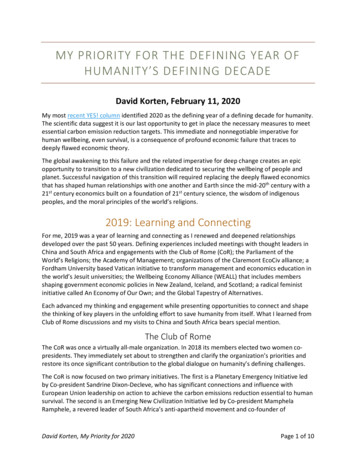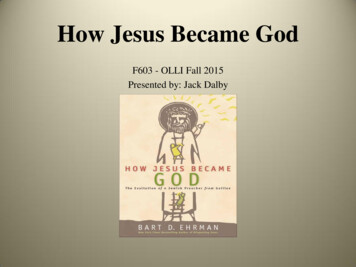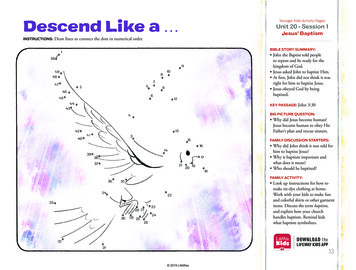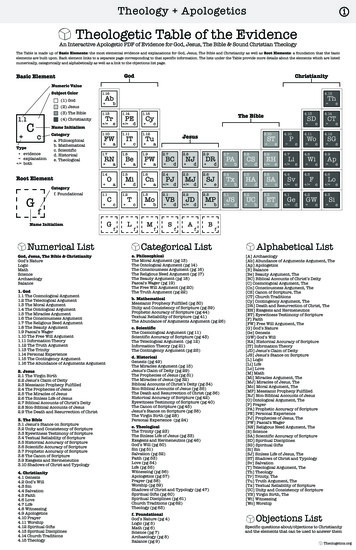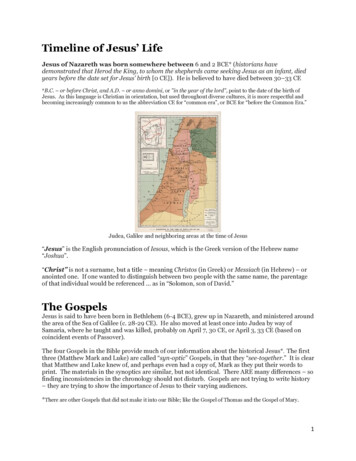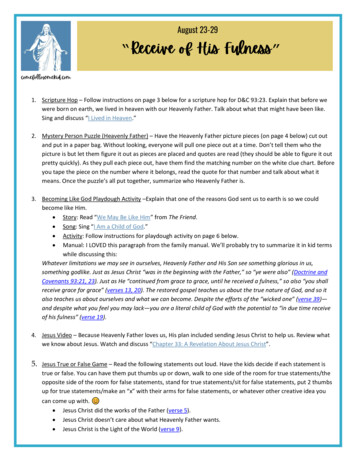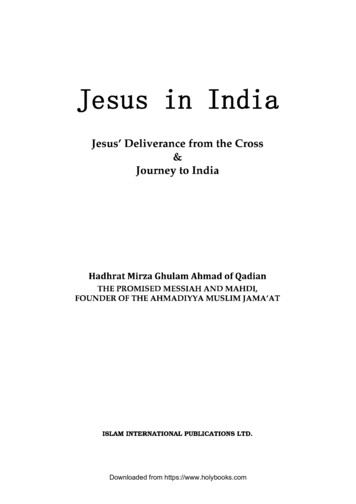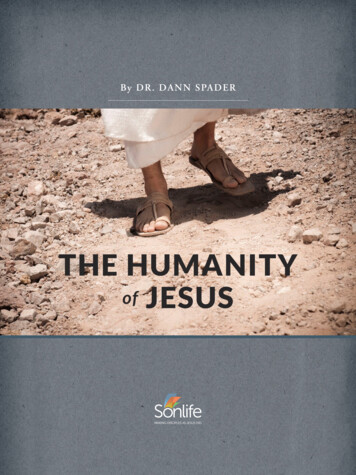
Transcription
By D R. D A N N S PA D ERTHE HUMANITYof JESUS
THE HUMANITYof JESUSBy DR. DANN SPADER(Updated 2011) Sonlife 2013PO Box 3242, Bloomington, IL 61702, 309.807.2459www.sonlife.com
THROUGHOUT THE HISTORY OF SONLIFE, we have advocated that Christnot only gave us the message of the Gospels, but He also gave us the method of creatinga movement of multiplication.Understanding Christ’s life and ministry is foundational to understanding our life andministry. You need a strong Christology, or you’ll end up with a distorted ecclesiology.The Gospels show us Christ’s life and how to grow a healthy Great Commission ministry.Acts shows us how to multiply that ministry. The Epistles show us how to deepen andmaintain that ministry long-term.“Follow my example, as I follow the example of Christ,” is Paul’s conviction (1 Cor. 11:1).“ Christ suffered for you, leaving you an example, that you should follow in his steps,”challenges Peter (1 Pet. 2:21).“Whoever claims to live in him must live as Jesus did,” claims John (1 John 2:6).As you intensely study Christ’s life you will find that there are410 commands or imperatives in the Gospels. All but two arerecorded in the last eighteen months of Jesus’ ministry. DuringHis first two years of ministry, Jesus gives only these commandsto His followers:nTo repent (Mark 1:15; Matt. 4:17)nTo follow (John 1:43; Mark 1:17, 2:14; Matt. 4:19)Why? Jesus knew that before His disciples could do ministry withthe right motives, they would have to know who He was. A properunderstanding of who Jesus is was foundational to all growth andmaturity in the faith. Studying the humanity of Jesus forced meto look at the “real Jesus” of the New Testament in a fresh new way.Understanding the proper concept of Christ was the theme of oneof our Disciplemaking conferences. Christian researcher DavidBarret said that in 1996 there were 65,571 books written aboutJesus. Over 50,000 of these books had “Jesus” in their titles.In 1996 almost 1,500 new “Jesus” books came off the press—that’s four a day. Indeed, it is a very broad subject.This paper will focus on the fact that Jesus was fully God andfully man. Theologians call this the “hypostatic union.” I wantto address the critical question: What does it mean to me thatJesus was fully human?A few summers ago my family and I went on a vacation to Floridaand I pulled a book off my shelf that I had been given years before,Jesus: An Interview Across Time, by Jerry Hodges. This book is afictitious interview across time, looking at the humanity of Jesus.While not fully agreeing with all of the book, I have to admitit caused me to look at Jesus in a new, powerfully fresh way. Thiscaused me to begin over 200 hours of study into the humanityof Jesus. This paper and the message at our DisciplemakingConference are the culmination of that study.T H E H U M A N I T Y of J E S U SThe book begins in a fictitious, yet biblically intense, interviewwith Jesus. Let me paraphrase how the book began as an openingintroduction to this study.When did You first discover that You were the Messiah?Well, I was about ten years old. My mother had alreadyconcluded that she would let My Father show me who I was.You mean Joseph?No, I mean My Father in Heaven. Joseph was My stepfather.How did God show You that You were the Messiah? Did Heappear to You personally with His angels in full glory?Oh no, that would have changed part of His perfect plan!If God would have appeared directly to Me, I wouldn’t havebeen human like you. I would know nothing about studyingthe Scriptures, trusting Him and living by faith. How couldI teach you about faith if I hadn’t experienced it Myself?Instead, My Father slowly revealed to Me who I wasthrough His Word. You see, by this time, I had grownto love the Scriptures. Like all Jewish boys, we wouldgo to the synagogue and regularly study the Scripture.I had a very sensitive spirit and even as a young boyexperienced a lot of suffering and rejection. My peers in oursmall community often made fun of Me saying, “He doesn’tknow who His father is. . . . He doesn’t know who His Fatheris.” Even the adults ridiculed Me, between My home andthe synagogues were the town gate, where the businessmengathered. The local drinking establishment was also there.Occasionally, as I walked to the synagogue, I would hear thesnide comments of some of the men gathered at the gate. Butthe men at what you would call the “bar” were the worst ofall. They made up a song about Me where they would guesswho My father was and name about five or six despicable1
characters. It became a game each day to add another nameto the chorus, which they would sing as I passed by, andfinally all of them would laugh. Every day I was forced tothink: “I’m a bastard.” That’s who they were telling Me I was.A week later—you’ll see how God, the Master Director,blends in circumstances—My mother was sorting out thecontents of an old trunk and there on the floor was a littlecloth I had never seen before with an Egyptian design on it.I asked her, “Where’d we get this?” and she said, “In Egypt.”“In Egypt!” I stammered. She told Me that she and My fatherhad not wanted to frighten Me, but just after I was bornwas a dangerous time for Jewish boys. Herod, the RomanGovernor, had heard that the Messiah had been born andwas executing all male children two years old and younger.She and Joseph had moved to Egypt to be safe for a coupleof years. I began to understand that all the Scriptures werespeaking about Me as the Messiah. This is when I beganto intensely study them to learn about My Father’s planfor My life.It got so bad that even My half-brothers became ashamedof Me and harassed Me. James, who later wrote a NewTestament book about hypocrisy and the power of thetongue, treated Me quite badly. Jude, My other half-brother,also harassed Me—he too later wrote a book about hereticsand those who lack faith.As a result, I began to study and love the story of Joseph.As a young man, he was betrayed by his brothers and soldinto slavery. Joseph helped Me to learn to trust My Fathereven in tough times. As I studied about David, who at ayoung age displayed great courage in challenging Goliath,I gained comfort in God’s provision.You mean at first You read the Scriptures to find comfortand not to find out about the Messiah?As a Jew, there was always talk about the Messiah becausewe were an oppressed people. I was interested in the comingMessiah and longed for Him, but I didn’t initially see howHe particularly related to Me. Then one day I “accidentally”found out who I was.One night, I had come to my lowest point. I didn’t think Icould take the drunkards singing that song about Me one moretime. I decided, like in the Old Testament, to put on sackclothand ashes as a sign of My mourning. However, this just madematters worse. My stepdad, Joseph, encouraged Me to stop.Then the next day I “coincidentally” was reading the 69thPsalm, which as a Messianic Psalm was an exact descriptionof what had just happened to Me: “shame covers my face.I am a foreigner to my own family, a stranger to my ownmother’s children. . . . When I weep and fast, I must endurescorn; when I put on sackcloth, people make sport of me.Those who sit at the gate mock me, and I am the songof drunkards” (Ps. 69:7–8,10–12).This Messianic Psalm was an exact description of whatI had just experienced. I became very curious and beganto ask questions. One time, at the age of twelve, I spentthree days in the Temple asking questions and listeningto the leaders’ answers. I discovered that the Messiah wasto be from Galilee—I was from Galilee. He was to beof the tribe of Judah—I was of the tribe of Judah. Hewas to be of the city of David, Bethlehem—I was bornin Bethlehem. It was interesting to Me that the Messiahand I would be born in the same place, from the sametribe and the same neighborhood.However, a short time later, I came across another prophecythat stated the Messiah would come out of Egypt. Thatstruck Me as strange—an Israelite to be born in Bethlehemand from Galilee—how could He also be from Egypt?T H E H U M A N I T Y of J E S U SThroughout this fascinating book, Hodges portrays the God-man,Jesus, who “grew in wisdom and stature, and in favor with Godand man” (Luke 2:52).nHe portrayed a human Jesus who demonstrated reverentsubmission (Heb. 5:7).nHe offered up prayers and petitions with loud cries and tears(Heb. 5:7).nHe learned obedience from what He suffered (Heb. 5:8).nHe shared in our humanity (Heb. 2:14).nHe was made like us in every way (Heb. 2:17).nHe suffered when He was tempted (Heb. 2:18).nHe became obedient unto death, even death on a cross (Phil. 2:8).Jesus Was Fully GodWith a strong and deep conviction that Jesus was fully God,I began to look at the fully human aspect of Jesus. But beforeI go any further, let me quickly establish His deity. Jesus clearlyclaimed to be equal with His Father. In John 14:9, Jesus said thatto see Him was to see the Father. Jesus also claimed to exist priorto His incarnation. John 8:58 states, “Very truly I tell you. . . before Abraham was born, I am.” Some would argue thatthis statement could be translated, “Before Abraham came intobeing, I continuously existed” (Expositors Bible Commentary). TheJews recognized the phrase “I am” as one referring to the nameof God from the Old Testament (Exodus 3:14) and the theisticproclamations in the latter part of Isaiah.Jesus clearly claimed to be God, received worship as God, andwas crucified because of His claims. In John 5:17–18, one of thestrongest New Testament passages arguing for His deity, Jesussaid to them, “My Father is always at his work to this very day,and I too am working.” For this reason the Jews tried all the harderto kill Him. Not only was He breaking the Sabbath, but He waseven calling God His own Father, making Himself equal to God.This was clearly understood by the Jews as they later came afterHim, saying, “you, a mere man, claim to be God” (John 10:33).2
Philippians 2:5 restates this by saying, “Have the same mindsetas Christ Jesus: who, being in very nature God, did not considerequality with God something to be used to his own advantage.”Colossians 2:9 clearly says it this way, “For in Christ all thefullness of the Deity lives in bodily form.” Jesus was fully God!Was Jesus Fully Human?At the same time, as you study Scripture, it is easy to establishthe truth that Jesus was fully human. Hebrews 2:17 tells us He waslike us in all ways. Other passages in the life of Jesus demonstratethis truth. Some of them are:nHe was conceived (Matt. 1:18; Luke 1:31).nHe was born (Matt. 1:25, 2:2; Luke 2:7, 11).nHe partook of our flesh and blood (John 1:14; Heb. 2:14).nHe was circumcised (Luke 2:21).nHe increased in wisdom and stature (Luke 2:52).nHe wept (Luke 19:41; John 11:35).nHe hungered (Matt. 4:2, 21:18).nHe thirsted (John 4:7, 19:28).nHe slept (Matt. 8:24; Mark 4:38).nHe became weary (John 4:6).nHe was a man of sorrows (Isa. 53:3–4; Luke 22:44;John 11:33, 12:27).nHe was beaten (Matt. 26:67; Luke 22:64).nHe endured indignities (Luke 23:11).nHe was scourged (Matt. 27:26; John 19:1).nHe was nailed to the cross (Luke 23:33; Ps. 22:16).nHe died (John 19:30).nHe was pierced in His side (John 19:34).nHe was buried (Matt. 27:59–60; Mark 15:46).nHe was resurrected (Acts 3:15; 2 Tim. 2:8).nHe shared in our humanity, made like us in every way(Heb. 2:14, 17).When God became flesh and dwelt among us, becoming flesh wasnot a handicap or a mark of inferiority, but a conscious choiceon God’s part to become that God-man (a second Adam) fromHeaven (1 Cor. 15:47). He was God taking on flesh. As a result,Christ became the author and perfecter of our faith. In Hebrews 2,the writer list four results of His humanity.A. His humanity enabled Jesus to regain man’s lostdominion (Heb. 2:5–9).Man once had dominion over the earth (Gen. 1:26–28;Ps. 8:4–6) but lost that dominion as a result of the fall(Heb. 2:8). Jesus, by becoming man and suffering death,was crowned with glory and honor—He regained whatman once had and lost. Christ, now at the right hand ofGod rules over all (Eph. 1:20–22) and we together withHim (Eph. 2:4–6) will reign (Rev. 2:26–27, 3:21).B. His humanity enabled Jesus to bring many sonsto glory (Heb. 2:10–13).By Christ’s suffering and death, Jesus became the author of oursalvation (Heb. 2:10). He made us holy through His perfectholiness and is not ashamed to call us brothers in His family.He regained for us the life from above that man had lost.C. His humanity enabled Jesus to disarm Satan anddeliver us from the fear of death and purchasesalvation for us (Heb. 2:14–16).By His death and resurrection Jesus “destroyed” the devil(Heb. 2:14)! Satan once had the power of death, but no more(Rom. 8:37–39).D. His humanity enabled Jesus to be a sympathetic HighPriest (Heb. 2:17–18).Because Jesus was appointed and sent by God (Heb. 5:1) andmade like us in every way, He became a faithful and mercifulHigh Priest (Heb. 2:17). He was tempted in every way, yetwithout sin (Heb. 4:15), and thus is able to deal gently withthose who are ignorant and going astray (Heb. 5:2). Becauseof this we can go before His throne with confidence to receivemercy and find grace to help in our time of need (Heb. 4:16).How Did Christ Become Fully Human?Why Did Jesus Become Fully Human?In what is called the Kenosis Passage, Philippians 2:5–11 gives usa glimpse into how this hypostatic union came about. The Greekword “morphe,” which means “nature” or “substance,” is usedin verses 6 and 7. Verse 6 refers to the nature of God and verse 7refers to the nature of man. This Jesus, “being in the very nature[morphe] God did not regard equality with God something to begrasped but made himself nothing, taking the very nature [morphe]of a servant, being made in human likeness.”In a quick and yet profound way, Hebrews 2 gives us whyChrist needed to be fully human. In Hebrews 1, the emphasisis upon Jesus’ deity, but in Chapter 2 the emphasis shiftsto His humanity.In considering this hypostatic union, Charles Ryrie writes,“This concept of the union of the divine and human naturesin one person is probably one of the most difficult conceptsto comprehend in theology” (250).nHe was made in human likeness (Phil. 2:7).It is quickly clear as one reads the New Testament that Jesusshared in our humanity and was like us in all ways (exceptfor our sinfulness).T H E H U M A N I T Y of J E S U S3
He concludes that every major theological heresy can in one wayor another be traced to a distorted or faulty view of this hypostaticunion. This is important!5. Nestorianism: Two Natures and Two PersonsNestorius complicated this debate by saying that Jesus really hadtwo natures and thus became two separate and distinct persons.Eutychius sought to correct this view by uniting these twonatures into one person with a third nature. Both of these viewswere soundly rejected as a hybrid, neither divine nor human,or as having humanity that was swallowed up or overpoweredby divinity. Cyril, on June 7, 431, presented twelve anathemasfor these views along with condemning Nestorius.To understand this issue, we must look back at church historyto understand how this doctrine developed. There were five majorchallenges to the doctrine of Jesus being fully God and fully man.1. Ebionism: Denial of the Divinity of JesusOne of the earliest, and in some ways, simplest of misconceptionsabout Jesus was a movement known as Ebionism. They deniedthe divinity of Jesus. Among the new converts to Christianitywere a number of Jews. Judaism held to a strong monotheism.Initially, belief in the humanity and deity of Jesus seemed verypolytheistic to the new converts. Justyn Martyr (ca. 100–165)spoke of two types of Ebionites, as did Eusebius (ca. 260–340).2. Docetism: Denial of the Humanity of JesusDocetism, which denied the humanity of Jesus, was a moreformidable threat to early orthodox Christianity. Docetismwas the belief that Jesus was not genuinely human, thatHe merely “seemed” or “appeared” to possess human nature.This teaching arose very early and was probably the objectof the Apostles’ rebuttal in 1 John. Gnosticism found its rootsin this school of thought. Ignatius early on fought this wayof thinking, insisting that Jesus “was really born, and ate,and drank, was really persecuted by Pontius Pilate, wasreally crucified and died, and really rose from the dead”(Ignatius, Epistle to the Trallians, 9).3. Arianism: Denial of the Full Divinity of JesusSoon to follow was Arianism. This doctrine denied the fulldivinity of Jesus. This problem found its root in understandingof the Trinity. Their conclusion was that Jesus could not havebeen of the same nature as His Father and thus had to becreated by the Father as first born of many creations. Arianismmade Jesus more than human, but less than fully God. TheCouncil of Nicea in 325, called by Alexander, condemnedArianism; however, the debate continued for years. Athanasius(ca. 293–373) became the major spokesman against Arianism.4. Apollinarianism: Denial of the Full Humanity of JesusOn the other side of the spectrum, came Apollinarianism,which denied the full humanity of Jesus. This view held thatChrist had just one nature and that nature was predominantlydivine. Jesus was not really a man but only appeared tobe such. This view was quickly condemned by Orthodoxyat the Council of Rome in A.D. 377 because it underminedthe complete effectiveness of Christ’s salvation. The mostfamous phrase in the refutation of Apollinarianism wasthat of Gregory of Nazianzus, “What has not been assumedcannot be restored; it is what is united with God that is saved”(Gregory of Nazianzus, Epistles, 101). This view was criticalin that if Christ did not assume the whole of human nature,the effectiveness of His redemptive work was undermined.T H E H U M A N I T Y of J E S U SCouncil of Chalcedon: The Orthodox StatementThese challenges were addressed at the Council of Chalcedon inA.D. 451 with a statement on the deity and humanity of Christwhich has stood the test of time. This lengthy response of ourchurch fathers took three basic actions.1.They reaffirmed the Nicene Creed as expressive of orthodoxy.2.They rejected both Nestorianism and Eutychinism.3.Finally, they adopted a statement of their own, which wasto be the standard of Christological orthodoxy for many yearsto come. According to Millard Erickson, in The Word BecameFlesh, “Thus it not only settled the immediate issues undercontention, but also summed up the earlier decisions in onecomprehensive statement” (65).The Chalcedon statement reads:“We, then, following the holy Fathers, all with one consent,teach men to confess one and the same Son, one LordJesus Christ; the same perfect in Godhead and also perfectin manhood: truly God and truly man, of a reasonable[rational] soul and body; consubstantial [co-essential] withthe Father according to the Godhead, and consubstantialwith us according to the manhood: in all things like unto uswithout sin; begotten before all ages of the Father accordingto the Godhead, and in these latter days, for us and forour salvation, born of Mary, the Virgin Mother of God,according to the Manhood; one and the same Christ, Son,Lord, Only-Begotten, to be acknowledged in two natures,inconfusedly, unchangeably, indivisibly, inseparably, thedistinction of natures being by no means taken away bythe union, but rather the property of each nature beingpreserved, and concurring in one person [prosopon] andone hypostasis, not parted or divided into two persons, butone and the same Son, and Only-Begotten, God the Word,the Lord Jesus Christ, as the prophets from the beginninghave declared concerning Him, and the Lord Jesus ChristHimself has taught us, and the creed of the holy Fathershas delivered to us” (62–63).The phrase “two natures, inconfusedly, unchangeably, indivisibly,inseparably” became the defining phrase. In other words, we mustattribute to Jesus that He is both fully God and fully man. Wemust not mingle the human and divine so that we end up withJesus being neither human nor divine. And, we must not dissect4
Christ so that there are two persons in one being. The phrase“two natures, inconfusedly, unchangeably, indivisibly, inseparably”has stood through the years as the definitive test of orthodoxyfrom that time until now.Philip R. Johnson writes, “The fact is that every heresy that hasever surfaced with regard to the Person of Christ either fuses orseparates the deity and the humanity of Christ. Chalcedon declaredthat the two natures can be neither merged nor disconnected.Christ is both God and man. Truly God and truly man.”Philippians 2 gives us a glimpse of how the Word became fleshand dwelt among us—how God and man were united into thisGod-man, Jesus.Verse 6 tells us that Jesus, “who being in the very nature God didnot regard equality with God something to be grasped.” Now letme ask you a question: Who is equal to God? The answer to thatquestion can only be what Paul is driving at—only God is equal toGod and Jesus was God. But incredibly, we are told in verse 7 thatChrist emptied Himself, taking on an aspect like that of a servant!How did God add humanity to His deity? Some would argue thatChrist gave up His deity to take on humanity. But that is wrong—Christ didn’t give up His deity—He was fully God and fully man.For Jesus, who was omniscient and omnipresent, something drastichad to happen to become fully human.Philippians 2:7 tells us what happened, that “he made himselfnothing, by taking the very nature of a servant.” God chose totemporarily cloak His deity, to veil it, in order that His humanitycould find full expression. By adding humanity, He chosetemporarily to restrict the full expression of His deity.Imagine with me for a moment a king who rules a vast kingdom.This king has everything—servants who wait upon him, a richwardrobe and vast banquets for every meal. Everything that hedesires is brought to him. One day, as he is surveying his kingdom,he observes beggars in the street. He feels pity and wants to helpthem. The king decides that, to really help these homeless people,he needs to become like them. While still remaining king, retainingevery right, authority and all the riches, he takes off his royalgarments and puts on the clothes of a beggar. Then he leaves hiscastle and goes to the streets to live like a beggar. He lives exactlyas they live—begging for food and sleeping in the cold streets.People pass by mocking and spitting on him. The king suffersgreatly. As king, he can call for his army at any time to retaliateagainst those people who treat him unjustly. He chooses not to.He cannot do that and fully experience life as a beggar. Thehomeless can’t call for the royal army to protect them. To fullyexperience the beggar’s life, he lays aside not his kingdom orkingship, but the use of the rights that are his as king. The kingadds a beggar’s life to his royal life.This is a picture of what the incarnation is all about. Christ,who is eternal God, became flesh and dwelt among us. ThoughHe was rich, for our sakes He became poor. That through Him,we who were poor might become rich.T H E H U M A N I T Y of J E S U SWhat Does It Mean That JesusWas Fully Human?Haddon Robinson, in his sermon “The Heresy of Application,”states that most errors in preaching are not made in the exegesis ofthe text, but in the application of the text to life. With this cautionin mind, I want to seek to apply these truths to our lives. I’ve cometo four conclusions in studying the hypostatic union.Conclusion #1 — Jesus did not dip into His deityto live out His humanity.If Jesus had used His deity to live out His humanity, He wouldnot have been fully human. He would have been less or more(depending upon your perspective) than human. Instead, He“shared in our humanity” (Heb. 2:14) and “he had to be madelike them [his brothers], fully in every way” (Heb. 2:17).What a profound thought! Jesus, with His sinless naturethroughout His earthly life, experienced all of life as we do.He did not utilize His divine power to live out His human lifeon earth. Jesus was that second Adam, who lived in a world filledby sin, greed, lust, and pride, just like us. And yet He did not sin.From the first minute of His life, all the way to His last minuteson the cross, Jesus, in reverent submission to His Father, obeyedHim in all aspects! Amazingly, He did this without dipping intoHis deity to live out that humanity!To fully understand this is to better understand the temptationsof Jesus. In the wilderness, Satan tempted Jesus to use His deityto turn stones into bread to meet His personal needs. Jesus resisted,saying, “man does not live by bread alone.” Peter in Matthew 16becomes a major stumbling block to Jesus when he suggests Jesusdoesn’t need to go to the cross. Jesus then tells His disciples,“If anyone would come after me, he must deny himself andtake up his cross and follow me” (Matt 16:24).At this point, most people began to question this concept and say,“But what about . . . ?” Let’s look at those “what about” issues.I’ve listed three:1. What about Nathanael?“ ‘How do you know me?’ Nathanael asked. Jesus answered‘I saw you while you were still under the fig tree before Philipcalled you’ ” (John 1:48).Doesn’t this statement by Jesus prove His divinity? Surelythat proved He used His supernatural powers of deity! Notnecessarily. Remember that Jesus grew up in the area whereNathanael lived. He could have easily seen Nathanael onseveral other occasions under the fig tree before Philip calledhim. Or perhaps the Spirit of God again showed Jesus whatHe was doing (John 5:20). This was a work of the Spirit,which is also promised to guide us into all truth and to showus what the Father is doing (John 16:13). Or Jesus couldhave seen him earlier that day sitting under the fig tree.There could be a number of explanations outside of Jesususing His divinity.5
2. What about His miracles?Surely Christ’s miracles are proof that Jesus used His deity.Jesus could not have done all of His miracles without usingHis divine powers, right? Not necessarily. They are proofthat He is the Christ sent from His Father (John 10:25) butJesus in His own words tells us that He did nothing in andof Himself—everything He did was done through His Fatherand in submission to His Father’s desires.Let’s look at a few of Jesus’ own words (italics mine):n “Verytruly I tell you, the Son can do nothing by himself;he can do only what he sees his Father doing” (John 5:19).n “Bymyself I can do nothing . . . I seek not to please myselfbut him who sent me” (John 5:30).n “Justas the living Father sent me and I live because of theFather, so the one who feeds on me will live because of me”(John 6:57).n “Myteaching is not my own. It comes from the one whosent me” (John 7:16).n “Whenyou have lifted up the Son of Man, then you willknow that I am he and that I do nothing on my own . . .for I always do what pleases him” (John 8:28–29).n “Themiracles I do in my Father’s name testify about me”(John 10:25).n “Ihave shown you many good works from the Father”(John 10:32).n “ForI did not speak on my own, but the Father who sent mecommanded me to say all that I have spoken. . . . So whatever Isay is just what the Father has told me to say” (John 12:49–50).n “ Thewords I say to you I do not speak on my own authority.Rather, it is the Father, living in me, who is doing his work.Believe me when I say that I am in the Father and theFather is in me; or at least believe on the evidence of theworks themselves” (John 14:10–11).n “Nowthey know that everything you have given me comesfrom you” (John 17:7).n “Hecould not do any miracles there, except lay his handson a few sick people and heal them. He was amazedat their lack of faith” (Mark 6:5–6).Jesus, as that second Adam, in reverent submission toHis Father, became a conduit of the power of His Fatherflowing through Him, as everything He did was done inacknowledgment of His Father’s work. In the same way,we find Jesus saying to us—just as my Father has sent me,so send I you. Just as Jesus modeled total dependence, He thentold us in John 15:5 “apart from me you can do nothing.”The Apostles in the Book of Acts followed Christ’s exampleby acknowledging every miracle as coming only from God’sworking through them.T H E H U M A N I T Y of J E S U Sn “FellowIsraelites, listen to this: Jesus of Nazareth wasa man accredited by God to you by miracles, wondersand signs, which God did among you through him,as you yourselves know” (Acts 2:22).n “ThenPeter said, ‘Silver or gold I do not have, but what Ido have I give you. In the name of Jesus Christ of Nazareth,walk’ ” (Acts 3:6).n “WhenPeter saw this, he said to them: ‘Fellow Israelites,why does this surprise you? Why do you stare at us as if byour own power or godliness we had made this man walk?’ ”(Acts 3:12).3. What about His knowledge?Didn’t Jesus know all things? He knew things before theyhappened—doesn’t that prove He used His deity to live out Hishumanity? Not necessarily. Eleven different times in the Gospelsit said that Jesus “knew” something that others did not seemto know. On five occasions He “ knew” people’s thoughts:n “Butwhen the Pharisees heard this, they said, ‘It is onlyby Beelzebub, the prince of demons, that this fellow drivesout demons.’ Jesus knew their thoughts” (Matt. 12:24–25).n “Nowsome teachers of the law were sitting there,thinking to themselves, ‘Why does this fellow talk like that?He’s blaspheming! Who can forgive sins but God alone?’Immediately Jesus knew in his spirit that this was whatthey were thinking in their hearts” (Mark 2:6–8; also seeLuke 5:22).n “ThePharisees and the teachers of the law were lookingfor a reason to accuse Jesus, so they watched him closelyto see if he would heal on the Sabbath. But Jesus knewwhat they were thinking” (Luke 6:7–8).n “Otherstested him by asking for a sign from heaven.Jesus knew their thoughts” (Luke 11:16–17).Do these occurrences mea
Barret said that in 1996 there were 65,571 books written about Jesus. Over 50,000 of these books had “Jesus” in their titles. In 1996 almost 1,500 new “Jesus” books came off the press— that’s four a day. Indeed, it is a very broad subject. This paper will focus on the fact

